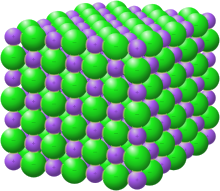
| |
| Names | |
|---|---|
| Other names
Dysprosium mononitride, azanylidynedysprosium
| |
| Identifiers | |
3D model (JSmol)
|
|
| ECHA InfoCard | 100.031.487 |
| EC Number |
|
PubChem CID
|
|
CompTox Dashboard (EPA)
|
|
| |
| |
| Properties | |
| DyN | |
| Molar mass | 176.507 g·mol−1 |
| Appearance | solid |
| Density | 9.93 g/cm3[1] |
| reacts with water | |
Except where otherwise noted, data are given for materials in their standard state (at 25 °C [77 °F], 100 kPa).
| |
Dypsrosium nitride is a binary inorganic compound of dysprosium and nitride with the chemical formula DyN.[2]
Preparation
Dysprosium can be prepared from the reaction of finely ground dysprosium, dysprosium hydride, or the dysprosium amalgam with nitrogen at 800–1000°C:[3][4]
- 2Dy + N2 → 2DyN
Physical properties
Dypsrosium nitride forms gray crystals of cubic system; cell parameter a = 0.490 nm, Z = 4.[1] It is a good conductor of electricity and reacts with water. It is known for its magnetic properties and high melting point.
References
- ^ a b Lide, David R. (26 June 2006). 1998 Freshman Achievement Award. CRC Press. p. 4-63. ISBN 978-0-8493-0594-8. Retrieved 1 February 2024.
- ^ Ettmayer, Peter; Waldhart, Johann; Vendl, Alfred (1979). "Ûber die Mischbarkeit von UN mit LaN, CeN, PRN, NDN, SMN, GDN, DyN, und ErN". Monatshefte fuer Chemie. 110 (5): 1109–1112. doi:10.1007/BF00910958. S2CID 91894016.
- ^ Jaques, Brian J.; Osterberg, Daniel D.; Alanko, Gordon A.; Tamrakar, Sumit; Smith, Cole R.; Hurley, Michael F.; Butt, Darryl P. (15 January 2015). "In situ characterization of the nitridation of dysprosium during mechanochemical processing". Journal of Alloys and Compounds. 619: 253–261. doi:10.1016/j.jallcom.2014.08.193. ISSN 0925-8388. Retrieved 1 February 2024.
- ^ Olevsky, E. A.; Bordia, Rajendra (4 February 2010). Advances in Sintering Science and Technology. John Wiley & Sons. p. 22. ISBN 978-0-470-59970-9. Retrieved 1 February 2024.








